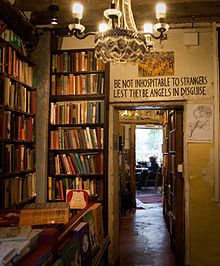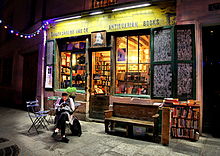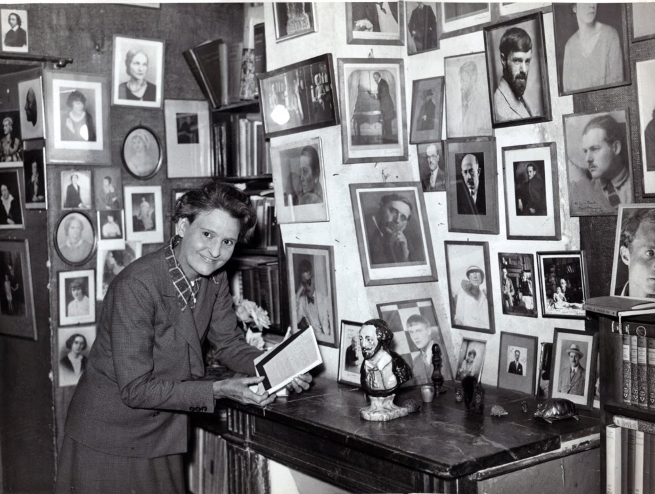World History
Related: About this forum100 Years of Shakespeare & Company Bookstore In Paris
Last edited Sat Nov 16, 2019, 12:48 PM - Edit history (1)
Once a haven for modernist pioneers, the beautifully cluttered bookshop is now a legend, known for letting travellers stay the night– if they write an autobiography. The Guardian, Nov. 15, 2019. Excerpts:
There are currently 4,000 reviews of Shakespeare and Company on TripAdvisor. Many of them describe the shop as “magical” or “a dream”. Some mention its pedigree – the famous writers including F Scott Fitzgerald, James Joyce and Ernest Hemingway who went there, the films and TV programmes shot there. Even those that don’t rate the shop – who think the stock isn’t good enough or complain that it’s too crowded – recommend visiting, talking of its history and its proximity to Notre Dame.
As a Paris landmark, which turns 100 this month, it is ranked below the Eiffel Tower and above the crumbling angels of Père-Lachaise cemetery. But how does a bookshop become a place of pilgrimage, a tourist trap and an emblem for a city, all at once?

There are no Shakespeare and Company equivalents in any other city..There’s the fact that the shop itself is beautiful: the dark wood, creaking like a ship, low-hanging absinthe-coloured lanterns giving off a dim, gold light. Its slight disorderliness – books stacked on the floor, wedged in too-small gaps on shelves, rested in the rungs of ladders – is undeniably attractive in a world where the majority of our novels are bought on the recommendation of an algorithm on a clean, white website. And its location is perfect too, allowing it to claim some of the long-dissipated bohemian charm left over by the artists and intellectuals of the old Rive Gauche, while being a quick walk from tourist favourites.
But much of Shakespeare and Company’s tourist-drawing power comes from its glamorous history. The original shop was founded by Sylvia Beach, one of many American expats after the first world war drawn by the lure of Parisian life and the declining value of the franc. Beach’s life story is inextricable from that of Shakespeare and Company. She and her long-term partner, bookshop owner Adrienne Monnier, opened the shop in Paris in 1919. It was immediately frequented by the stars of the French literary scene, such as Valery Larbaud and Jules Romains. Ezra Pound soon followed. Then TS Eliot, Djuna Barnes, Fitzgerald, Joyce, Hemingway.

37 Rue de la Bucherie, Paris Left Bank in the shadow of Notre Dame, 2nd store opened 1951
The shop barely made a profit but no matter; this was a social movement, not merely a bookshop. Maybe it helps that the 1920s are the definitive time for literary salons in the public imagination: we see the names of modernists, we think of Gertrude Stein and Alice B Toklas, the Bloomsbury Group.. Hemingway and Joyce are the stars of this fabled milieu. In addition to bookselling, Beach was a publisher. In 1922, she published Ulysses in English for the first time, printing 1,000 numbered copies on handmade paper..
It was supposedly Beach’s refusal to sell her last copy of Finnegans Wake to a German soldier in Vichy France that led to her closing the shop – the soldier threatened to confiscate her books, which were hidden on the fourth floor. She comforted American soldiers being sheltered by the French resistance, hid Arthur Koestler in her attic from the Nazis, and was interned in a camp for her anti-fascist sentiments...
https://www.theguardian.com/books/2019/nov/15/100-years-shakespeare-and-company-paris-modernist-tourist
https://en.wikipedia.org/wiki/Shakespeare_and_Company_(bookstore)

Sylvia Beach at Shakespeare & Co.
unc70
(6,495 posts)This is the title of a fascinating documentary about George Whitman and Shakespeare & Co. I found it particularly interesting because I had spent a lot of time there while living in Paris in the mid 1970s. At that time, the bookstore was more welcoming to Americans and the English language than almost anywhere in France. Really hard to describe the weird mixture of people and events that it attracted and nourished.
(By the late 1980s, the attitudes of the French towards Americans had changed remarkably.).
appalachiablue
(43,944 posts)I first visited the bookstore in the early 80s he was the operator. A decade later in San Francisco I saw City Lights as well.
It's fine that he invited so many guests, 'tumbleweeds' to stay over at the store for many years and he lived a long life until age 98.
Thanks for mentioning Whitman, I saw many articles about him online when researching the store.
appalachiablue
(43,944 posts)- Open Culture, 'Remembering George Whitman.'
In 2005, the Sundance Channel aired Portrait of a Bookstore as an Old Man, a 52 minute documentary that pays homage to George Whitman, the American founder of the most famous independent bookstore in Paris, Shakespeare and Company. Whitman died yesterday, at age 98, in his apartment above the store.
Sylvia Beach first opened a bookshop named Shakespeare and Company in 1918, and it soon became a home for artists of the "Lost Generation" (Hemingway, Pound, Fitzgerald, Stein, etc.). It also famously published James Joyce's Ulysses in 1922. The shop eventually closed during the Nazi occupation of Paris.
Yet a good decade later, George Whitman came along and established another English-language bookstore on the Left Bank and eventually rechristened it Shakespeare and Company. Whitman's shop gave sanctuary to Beat writers – Allen Ginsberg, William S. Burroughs and the rest. And it's this incarnation of the fabled bookstore that the documentary takes as its subject. Give the documentary some time, and be sure to watch the last five minutes – unless you already know how to cut your hair with fire. It will give you a little feel for Whitman and his well-known eccentricities. RIP.
http://www.openculture.com/2011/12/remembering_george_whitman.html
- Wiki, George Whitman (1913-2011)...With his own collection of one thousand books, Whitman opened his Paris bookstore in 1951 at 37 rue de la Bûcherie on the Left Bank. It was first called Le Mistral, but was later renamed Shakespeare and Company, after Sylvia Beach's earlier Paris bookstore (1919 to 1941). Beach, who visited Whitman's bookstore, is said to have called his shop the "spiritual successor" to her own. Whitman's shop opened just two years before his friend Lawrence Ferlinghetti co-founded City Lights in San Francisco. The two men had met in Paris in 1948.
Since 1951, when the shop opened, Whitman would invite travelers—usually aspiring writers, poets, and artists—to stay in the shop for free. In exchange, they were asked to help out around the bookstore, agree to read a book a day, and write a one-page autobiography for the shop's archives. Whitman called these guests "Tumbleweeds" after the rootless plants that "blow in and out on the winds of chance," as he described. On Sunday mornings, Whitman would traditionally cook his guests a pancake breakfast, brewing up a thin ersatz "syrup" out of some burnt sugar and water. Since 1951, an estimated 30,000 people have slept at Shakespeare and Company in beds found tucked among the shelves of books.
Whitman's only child, Sylvia Whitman, was born in 1981. She now runs Shakespeare and Company with her partner, David Delannet.
George Whitman was awarded the Officier de l'Ordre des Arts et des Lettres in 2006, one of France's highest cultural honor.
Whitman was the subject of a documentary titled Portrait of a Bookstore as an Old Man by Gonzague Pichelin and Benjamin Sutherland broadcast on The Sundance Channel in fall 2005. At the end of the film, Whitman trimmed his hair using the flame of a candle, set his hair on fire, and then doused it.
On Wednesday, September 26, 2007, journalist Gerry Hadden's story on George Whitman, his daughter Sylvia Beach Whitman, and Shakespeare and Company aired on NPR's The World (a co-production of the BBC, Public Radio International (PRI), and the Boston radio station WGBH). https://en.wikipedia.org/wiki/George_Whitman
